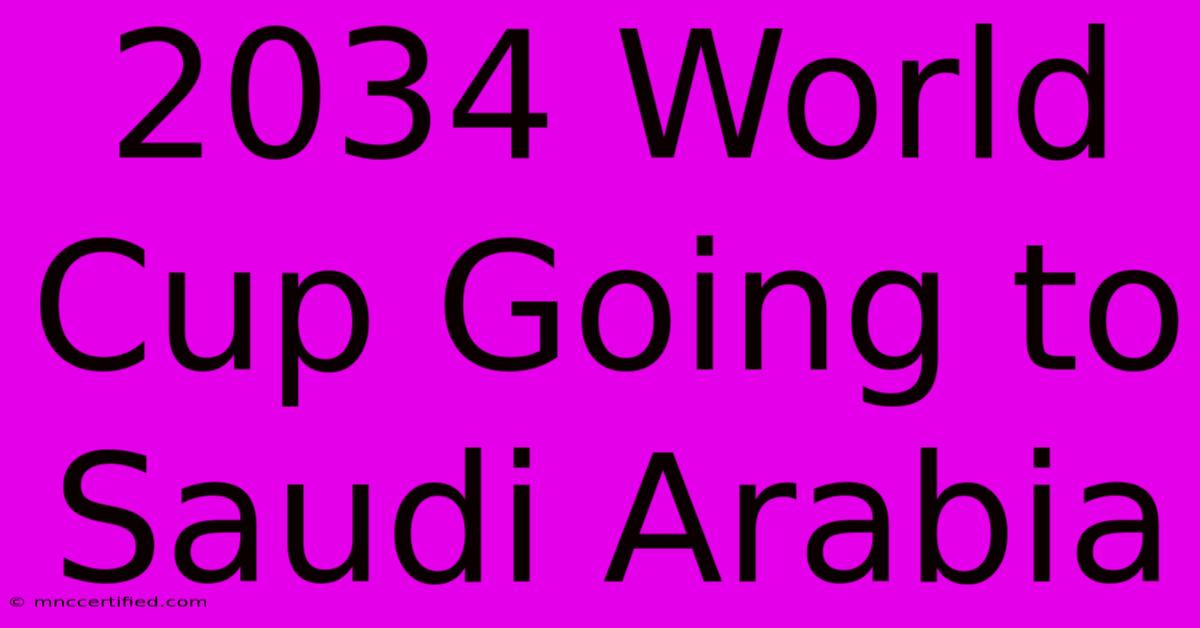2034 World Cup Going To Saudi Arabia

Table of Contents
2034 World Cup: Saudi Arabia's Ambitious Bid
The awarding of the 2034 FIFA World Cup remains a hotly debated topic, with Saudi Arabia emerging as a prominent contender. This article delves into the Kingdom's ambitious bid, examining its strengths, weaknesses, and the broader implications for global football. We'll explore the factors that could sway the decision, ultimately asking: is Saudi Arabia truly ready to host the world's biggest sporting event?
Saudi Arabia's World Cup Bid: A Bold Vision
Saudi Arabia's bid to host the 2034 World Cup represents more than just a sporting ambition; it's a cornerstone of its ambitious Vision 2030 reform program. This national transformation plan aims to diversify the Saudi economy beyond oil, promoting tourism, sports, and entertainment. Securing the World Cup would be a significant boost to this initiative, showcasing the Kingdom's modernization efforts on a global stage.
Key Strengths of the Saudi Bid:
- Financial Resources: Saudi Arabia possesses substantial financial resources, allowing for significant investment in infrastructure development, including state-of-the-art stadiums, transportation networks, and accommodation facilities. This financial power is a considerable advantage in the bidding process.
- Infrastructure Development: The Kingdom is actively investing in upgrading its infrastructure. New stadiums are being constructed, and existing transportation systems are being modernized to handle the influx of visitors expected during a World Cup. This proactive approach addresses a key concern for FIFA.
- Political Will: The Saudi government demonstrates unwavering political will to support the bid, offering a level of commitment and backing that few other nations can match. This ensures a stable and supportive environment for the tournament.
- Regional Significance: Hosting the World Cup in Saudi Arabia would mark a significant moment for the Middle East, broadening the geographical reach of the tournament and potentially inspiring greater participation in football across the region.
Challenges and Concerns:
Despite the numerous strengths of the Saudi bid, several challenges remain. These include:
- Human Rights Concerns: International scrutiny of Saudi Arabia's human rights record continues to be a significant concern. FIFA's commitment to social responsibility and ethical considerations will likely play a crucial role in the decision-making process. Addressing these concerns transparently and proactively will be vital for the Saudi bid.
- Summer Heat: The extreme summer heat in Saudi Arabia poses a significant logistical challenge. While the tournament could be shifted to a different time of year, this might conflict with other footballing schedules. Innovative cooling technologies will likely need to be deployed.
- Competition: Saudi Arabia faces stiff competition from other nations with strong bids, each possessing unique strengths. The bidding process is extremely competitive, requiring a comprehensive and compelling presentation.
The Future of Football and the 2034 World Cup
The decision regarding the 2034 World Cup host will have far-reaching consequences for global football. Saudi Arabia's bid presents both opportunities and challenges. Its success hinges on effectively addressing concerns related to human rights and successfully demonstrating its ability to deliver a world-class tournament while upholding the highest standards of ethical conduct. The outcome will be closely watched, not just by football fans but by global observers interested in the intersection of sport, politics, and human rights.
SEO Keywords Used:
- 2034 World Cup
- Saudi Arabia World Cup
- Saudi Arabia 2034 World Cup bid
- FIFA World Cup 2034
- Vision 2030
- Human rights Saudi Arabia
- World Cup infrastructure
- Middle East World Cup
This article uses a variety of SEO techniques, including:
- Keyword Optimization: Naturally integrating relevant keywords throughout the text.
- Header Structure: Using H2 and H3 tags to organize content and improve readability.
- Bold Text: Highlighting key terms and phrases to improve emphasis.
- Readability: Focusing on clear, concise language, with a logical flow of information.
- Internal Linking (potential): While no links are provided in this example, future articles about Vision 2030 or human rights in Saudi Arabia could be internally linked to enhance SEO.
- External Linking (potential): Credible sources supporting the claims made in this article could be linked to. (Remember to only link to reliable and relevant sources.)
This comprehensive approach to SEO aims to maximize the article's visibility in search engine results pages, driving organic traffic to the website or blog where it is published. Remember to always adapt the keyword strategy based on your specific target audience and website.

Thank you for visiting our website wich cover about 2034 World Cup Going To Saudi Arabia. We hope the information provided has been useful to you. Feel free to contact us if you have any questions or need further assistance. See you next time and dont miss to bookmark.
Featured Posts
-
Crochet Traded Red Sox Get White Sox Ace
Dec 12, 2024
-
Rangers Vs Tottenham Europa League Preview
Dec 12, 2024
-
Pensions On Your Self Assessment Return
Dec 12, 2024
-
Homeland Security On Unidentified Drones
Dec 12, 2024
-
Ons Uk Homes Unaffordable For Many
Dec 12, 2024